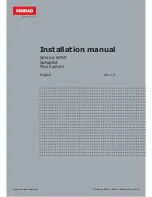
Garmin G1000 NXi Pilot’s Guide for the Cessna NAV III
190-02177-02 Rev. A
SY
STEM
O
VER
VIEW
FLIGHT
INSTRUMENTS
EIS
AUDIO P
ANEL
& CNS
FLIGHT
MANA
GEMENT
HAZARD
AV
OID
ANCE
AFCS
ADDITIONAL FEA
TURES
APPENDICES
INDEX
352
HAZARD AVOIDANCE
AIRBORNE AND SURFACE APPLICATIONS
ADS-B traffic can help the pilot visually acquire traffic both in the air and on-the-ground. There are two ADS-B
applications or modes: Airborne Situational Awareness (AIRB) and Surface Situational Awareness (SURF). The
system automatically selects the appropriate application based on conditions.
The AIRB application is on when the aircraft is more than five NM and 1,500 feet above the nearest airport.
When the AIRB application is active, the system only displays traffic which is airborne.
The SURF application is on when the aircraft is within five NM and less than 1,500 feet above field elevation.
When the SURF applications is on, the system displays airborne and on the ground traffic. At a ‘Map - Traffic
Map’ Page range of one nm or less, the airport environment (including taxiways and runways) appears in
addition to traffic. The airport displays are derived from the SafeTaxi database. Refer to the Additional Features
section for more information about SafeTaxi displays.
NOTE:
Do not rely on the solely on the traffic display to determine the runway alignment of traffic, especially
when runways are in close proximity to each other.
Due to the varying precision of the data received via ADS-B, ADS-R, and TIS-B services, not all traffic symbols
may not be depicted on the traffic display. Because higher data precision is required for traffic to be displayed
in the SURF environment, some traffic eligible for AIRB will not be displayed while SURF is on. Availability for
AIRB and SURF is depicted on the ‘Aux - ADS-B Status’ Page, discussed later in this section.
Figure 6-83 ‘Map - Traffic Map’ Page with SURF Mode On
Aircraft on the
ground
SURF Application On
Ground-based
vehicle
















































